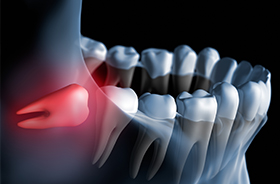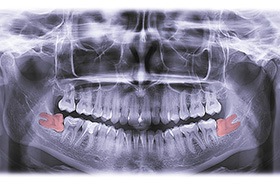
Wisdom Tooth Extractions – Woodbridge, CT
Address and Prevent Oral Health Complications

Are you experiencing a dull but persistent pain toward the back of your jaw? If so, and if you have not yet had your wisdom teeth removed, then they are likely to blame. Every year, countless individuals get their wisdom teeth removed with the goal of addressing and preventing oral health complications. At New Haven Dental Group, we are able to perform safe and effective wisdom tooth extractions in our Woodbridge, CT, dental office.
Why Choose New Haven Dental Group for Wisdom Tooth Extractions?
- Sedation Dentistry Options Available
- Highly Experienced and Skilled Team
- Advanced Technology for Excellent Care
What Are Wisdom Teeth?

Wisdom teeth are the third set of molars, which are located at the back of the mouth. They are usually the last to come in, normally appearing in adolescence or early adulthood.
The prevailing theory is that due to the rough diet of our ancient ancestors, they needed an extra set of molars — the wisdom teeth. As cooking techniques have improved and food has become easier to eat, the human jaw has become smaller over time, meaning that the wisdom teeth do not fit in most people’s mouths.
Why Do Wisdom Teeth Need to Be Removed?

Not everyone needs to get their wisdom teeth removed. However, most people do. If your mouth cannot comfortably accommodate your third set of molars, they may cause various complications as they struggle to come in, including pain, crowding of the teeth, and even infections.
Our team will monitor your wisdom teeth at routine checkups. If we ever believe they are starting to cause problems, or that they may do so in the near future, we will recommend that you get them removed.
What to Expect from the Wisdom Teeth Procedure

We will thoroughly numb your mouth and may administer sedation for your wisdom tooth procedure. We want you to feel comfortable!
If the teeth have fully erupted from your gumline, we will use an instrument called an elevator to lift them before we gently rock them back and forth to break the connective tissues holding them in place.
If your wisdom teeth are impacted (stuck fully or partially beneath the gumline), it might be necessary to create incisions in your gums or break the teeth into pieces in order to remove them.
Recovering From Wisdom Teeth Extraction

Most people are well-recovered from wisdom teeth extractions within 1 – 2 weeks. In the meantime, there are steps you can take to facilitate a smooth and complication-free post-op experience:
- Take any medications as prescribed by our team.
- Get enough rest.
- Eat a soft diet that involves little to no chewing.
- Do not smoke or drink through a straw.
- Stick to a good oral hygiene routine, but be very careful around your extraction sites.
- Call us if any questions or concerns arise.
Wisdom Tooth Extraction FAQs
Why Do We Have Wisdom Teeth?
The reason why we have wisdom teeth can be traced back to early human ancestors. They ate a very rough diet, which contained items like seeds, nuts, roots, and raw meats. They also had very limited eating utensils. As you can imagine, their eating habits took a toll on their teeth! By the time they reached late adolescence, a third set of molars (the wisdom teeth) may have been invaluable.
In modern times, thanks to a softer diet, eating utensils, and food processing techniques, wisdom teeth have become unnecessary. The average human mouth has even shrunk to the point where it can no longer accommodate them.
Should Wisdom Teeth Be Removed Before Braces?
If you need braces, it might be best to get your wisdom teeth removed before you start orthodontic treatment. That is because as the wisdom teeth try to emerge from the gumline, they can push against other teeth, possibly forcing them out of alignment and interfering with the progress of your orthodontic journey. After orthodontic treatment, the wisdom teeth could even make it difficult for your retainer to do its job.
After examining your X-rays, your orthodontic care provider can let you know for sure whether your wisdom teeth should be removed or if it may be okay to keep them.
For children who wore braces before their wisdom teeth started to develop, removing these third molars sooner rather than later is usually the wisest course of action.
How Soon Can I Eat After Wisdom Teeth Removal?
You may need to wait at least an hour or two. During this period, you should keep gauze pads in place to reduce bleeding. You should also allow time for any local anesthesia to wear off so you do not accidentally bite yourself or eat overly hot food.
Our team will provide instructions on what/when you should eat after your surgery. You may need to stick to a liquid diet for at least a few days to reduce discomfort and minimize your risk of post-op complications.
How Do You Avoid Dry Socket After Wisdom Teeth Removal?
Dry socket is a complication that occurs when the blood clot at the site of a tooth extraction gets dislodged or never forms in the first place. It can be very painful. Fortunately, you can keep your risk to a bare minimum by taking some simple precautions:
- Do not smoke.
- Be very careful when brushing near your extraction sites.
- Do not use drinking straws.
- Do not eat crunchy or hard foods.
- Do not touch your extraction sites with your fingers or tongue.
- Do not blow your nose.
If you notice that your tooth sockets look empty, or you start to experience unusual pain at your extraction sites, call our team for assistance right away.